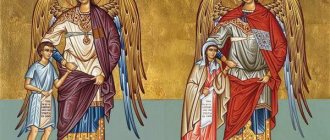Saint Valeria of Caesarea (Palestinian)
revered in the face of a martyr. Like most early Christian saints, very little is known about her. Moreover, some facts from different sources are sometimes contradictory. The Minology of Basil the Second and the Synaxarion of the Church of Constantinople, dating from the 10th century, tell about the holy martyr Valeria, and with her about the saints Kyriacia (Kyria) and Mary (Markia). “The Lives of the Saints” as presented by Dmitry of Rostov also contains their brief biographies. Instead of the name Valeria, in the unstitched Prologue of the first half of the 14th century (in its translation into Russian), the name Kaleria is found, therefore the holy martyr Valeria and Kaleria are one and the same person.
Valeria, Kyriacia and Maria lived in Caesarea in Palestine at the end of the 2nd - beginning of the 3rd centuries. The city was located on the shores of the Mediterranean Sea and was the main port of Palestine. After the fall of Jerusalem, Caesarea also became its capital, the socio-political center of the country. Roman procurators lived here. In the history of Christianity, Caesarea was glorified by the holy apostles and holy martyrs for the faith of Christ. Here the Apostle Peter baptized the military leader Cornelius and showed the pagans the advantages of converting to the new faith, here the Apostle Paul was arrested and sent to Rome. Before the fire (6th century), the local library kept an early handwritten edition of the Bible in several languages (“Hexallae of Origen”) and, according to Jerome of Stridon, the original Gospel of Matthew. In the 4th century, in Caesarea there lived a church historiographer and theologian, Bishop Eusebius Pamphilus of Caesarea, the author of “Ecclesiastical History,” who described the history of Christianity from its origins to the year 324...
Valeria, Kyriakia and Maria adopted Christianity from a certain follower of Jesus Christ. They were baptized and began to live in a secluded, modest dwelling. The girls' days were spent in fasting, silence and prayer for the triumph of Christ's faith over idolatry and for an end to the persecution of Christians. They lived by their labors, helped those in need, and guided everyone who visited them on the righteous path of their faith.
At that time, Emperor Diocletian was in power, whose reign (284-305) is considered in history to be the most severe period of persecution of those who believed in Christ. Having managed to restore peace within the country and strengthen the borders of the Roman Empire, Diocletian was unable to cope with the growing influence of Christianity. Under pressure from his co-ruler Galerius, the emperor issued 4 laws prohibiting new religious doctrine. Following the edicts, they closed churches, burned Christian books, demanded renunciation of faith on pain of death and loss of positions, and sentenced those who disagreed to death. Saint Valeria, together with her friends, continued to live according to Christian commandments. The pagans reported their activities to the rulers. The girls were captured and forced to make sacrifices to idols. Valeria was the first to refuse to do this, followed by her sisters in Christ. Sentenced to death, they were tortured for a long time, but the saints did not give up their convictions, humbly accepting martyrdom.
The day of remembrance of Saint Valeria of Caesarea is indicated in the Greek calendars as June 6, Art. According to the second edition of the Prologue, the date June 7, Art. was included in the calendars of the Russian Orthodox Church. Art. (June 20 n.st.), on which the holy martyrs Valeria, Kyriacia and Maria are remembered to this day. In Peter's Synaxarion of the mid-13th century and in some other sources of the Byzantine period, the memory of these saints is believed to be mistakenly combined with the memory of the holy martyrs Mary and Martha.
Saint Valeria (Kaleria) of Caesarea (Palestinian) patronizes women with this name. People turn to her for help in difficult situations and in resolving controversial issues.
It is very rare to find an icon of this saint in Christian churches. If she is not there, then they pray to the Martyr Valeria in front of the icon of All Saints, which is available in every church. A particle of the relics of the holy martyr Valeria (Kaleria) of Caesarea (Palestine) is located in the church of the village. Kurganovo (Sverdlovsk region, Russia).
PRAYER TO THE HOLY MARTYR VALERIE
Pray to God for me, holy servant of God Valeria, as I diligently resort to you, a quick helper and prayer book for my soul.
Troparion to the Holy Martyr Valeria
Your Lamb, Jesus, Valeria, calls with a great voice: I love You, my Bridegroom, and, seeking You, I suffer, and I am crucified, and I am buried in Your baptism, and I suffer for Your sake, for I reign in You, and I die for You, yes and I live with You: but, as an immaculate sacrifice, accept me, sacrificed to You with love. With your prayers, as if you are merciful, save our souls.
Saint Valeria, pray to God for us!
At the turn of the 2nd and 3rd centuries AD, three girls lived in the Palestinian city of Caesarea. One of them was called Valeria, and her friends were Kyriakia and Maria. Their houses were on the same street. They were friends since childhood and were inseparable, like sisters. They did everything together - they played and learned handicrafts.
Valeria was lively and decisive, Kyriakia was serious, Maria was thoughtful. They were connected by a love of nature. At the slightest opportunity, they left the walls of the city to wander among the rocks and trees. Sometimes things happened in the city that terrified the girls. They knew that there were people calling themselves Christians, and the rulers were doing everything to destroy them. Christians were tortured and killed, sometimes executions took place in the city square. On such days, many townspeople gathered there to watch what was happening. The girls could not understand why their relatives were attracted to such a spectacle.
One day, when Valeria, Kyriakia and Maria were walking outside the city, they met an old man by a stream. We said hello and started talking. Valeria asked where the old man was from. But he did not answer, but only said that he was a wanderer. Traveling through villages, he tells about Christ to those who want to hear the truth.
“Why aren’t you afraid! After all, in our country every Christian faces a sad fate!” – Valeria was surprised.
“A Christian is not afraid of anything. Do you want to know what gives such strength? - asked the old man.
Thus began a conversation that changed the girls’ lives forever. The knowledge they received from the wanderer filled their hearts with faith. Their souls, naturally full of goodness, were illuminated with light. Now their friendship was sealed by a secret - the friends became Christians.
Days and weeks passed, and it became increasingly difficult for the girls to be in Caesarea, where residents sacrificed unfortunate animals to the gods and where executions were carried out on people. Valeria invited her friends to leave the city and settle in the forest. There, hidden from human eyes, stood an abandoned house that previously belonged to some shepherd.
So they did. They lived very happily in solitude. Every day the girls greeted the sun with prayer and listened to the cheerful chirping of the birds. Their food was extremely scarce. They ate what they found in the forest and dreamed of planting a vegetable garden in the clearing behind the house.
A calm life was destroyed in an instant. Some man, a hunter, accidentally stumbled upon their home. He invited the girls to live together, promising to marry one of them. Stung by the refusal, he went to the city and reported to the ruler about three strange girls, probably Christians, living in the forest.
Valeria, Kyriakia and Maria appeared before the ruler. Ten warriors pointed sharp spears at the defenseless girls. Christian women confessed their faith. The ruler said: “You are too young, that’s why you are mistaken. Now agree to make a sacrifice in the temple, and I will let you go to your parents.” Valeria screamed: “No, this won’t happen!” Kyriakia, looking into the eyes of the ruler, clearly said: “No!”, and Maria shook her head, whispering: “I don’t agree.”
The friends held hands. They knew that death awaited them now, but they were not afraid. They already possessed the very power to overcome fear that the wanderer had told them about.
Meaning of the icon
The icon tells about the feat of Saint Valeria of Caesarea. The young girl gave her life for her faith. She was once a pagan, but her kind heart showed her the dark side of those who worshiped idols. She could have said, “I’m just not going to participate in this,” and moved on with her life like all the other people in Caesarea. But she chose a different path. By praying for all Christians in the world, giving her life for Christ, she showed what it means to be true to herself and her beliefs.
Deciding what the long-awaited baby will be called is a very responsible matter. Parents always want only the best for their son or daughter, and therefore choose a name very carefully. After all, it has long been known that its meaning influences a person’s fate. But sometimes even this is not decisive. Now parents want to choose the most beautiful, unusual name possible. But before everything was completely different. The newborn was named according to the calendar. The little man who was born received the name of the saint whose memory was honored on his birthday or on the day of christening. It was this monk who became the patron of new life and accompanied his namesake on his path. Therefore, modern parents should think about who will be next to their beloved child in the most difficult times.
But, as you know, there are quite a lot of saints in the Christian Church. Many of them have the same names. Even the seemingly rare name Valery can be found twice in the calendar. These are May 6 and June 20 (April 23 and June 7, old style). One could say that Valeria celebrates name days according to the church calendar twice a year. But that's not true. The girl's patroness will be only one saint. Therefore, it is worth learning a little better about the lives of those women whom the Church canonized.
Queen Valeria
The girl was forcibly married to the cruel pagan Maximian, who later became emperor. After his death, the new emperor, Maximin, wanted to marry Valeria. And for refusal, he exiles her and her mother, Queen Alexandra, to Syria, where they lived until his death. With the accession of a new ruler to the throne, the women wanted to return to their native Nicomedia. After all, according to rumors, Licinius did not hate Christians, but was even favorable towards them. But these conversations were false. The treacherous Licinius ordered the execution of the exiles. Their headless bodies were thrown into the sea.
Valeria of Caesarea
Another saint who bore this proud name was the martyr Valeria of Caesarea. She was born a pagan. But after meeting with an unknown Christian, she came to true faith. This prompted her to settle into seclusion and spend all her time in prayer for those who were mistaken in their beliefs, and for those who had converted to Christianity and were being persecuted. Her faith in Christ was so strong that it helped her withstand the brutal torture of the pagans, who forced her to renounce the true God.
Her memory is honored on June 20. It is on this day that Valeria’s name day is celebrated. A girl named after this saint can safely count on her help. By the way, Valeria of Caesarea is also known as Kaleria. And although according to civil documents Valeria and Kaleria are completely different people, according to the calendar they are two versions of the same name.
But it is quite possible that the parents named their daughter just like that, without thinking about who would be her patron. When, then, should Valeria’s name day be celebrated? The patroness will be the saint whose memorial day follows the girl’s date of birth.
Valeria's birthday is a worthy occasion to pay attention to this extraordinary, strong, bright, brave, bright and cheerful woman or girl. After all, before the day of remembrance of the patron saint was much more important than his birthday. It was then that guests were gathered, beer was brewed and rolls were baked. Of course, now such importance is no longer attached to this holiday, and Valeria prefers to celebrate her name day in a quiet home environment, but they will still appreciate sincere participation and congratulations.
Deciding what the long-awaited baby will be called is a very responsible matter. Parents always want only the best for their son or daughter, and therefore choose a name very carefully. After all, it has long been known that its meaning influences a person’s fate. But sometimes even this is not decisive. Now parents want to choose the most beautiful, unusual name possible. But before everything was completely different. The newborn was named according to the calendar. The little man who was born received the name of the saint whose memory was honored on his birthday or on the day of christening. It was this monk who became the patron of new life and accompanied his namesake on his path. Therefore, modern parents should think about who will be next to their beloved child in the most difficult times.
But, as you know, there are quite a lot of saints in the Christian Church. Many of them have the same names. Even, it would seem, Valery can be found twice in the calendar. These are May 6 and June 20 (April 23 and June 7, old style). One could say that Valeria celebrates name days according to the church calendar twice a year. But that's not true. The girl's patroness will be only one saint. Therefore, it is worth learning a little better about the lives of those women whom the Church has ranked among
Queen Valeria
The girl was forcibly married to the cruel pagan Maximian, who later became emperor. After his death, the new emperor, Maximin, wanted to marry Valeria. And for refusal, he exiles her and her mother, Queen Alexandra, to Syria, where they lived until his death. With the accession of a new ruler to the throne, the women wanted to return to their native Nicomedia. After all, according to rumors, Licinius did not hate Christians, but was even favorable towards them. But these conversations were false. The treacherous Licinius ordered the execution of the exiles. Their headless bodies were thrown into the sea.
Valeria of Caesarea
Another saint who bore this proud name was the martyr Valeria of Caesarea. She was born a pagan. But after meeting with an unknown Christian, she came to true faith. This prompted her to settle into seclusion and spend all her time in prayer for those who were mistaken in their beliefs, and for those who had converted to Christianity and were being persecuted. Her faith in Christ was so strong that it helped her withstand the brutal torture of the pagans, who forced her to renounce the true God.
Her memory is honored on June 20. It is on this day that Valeria’s name day is celebrated. A girl named a saint can safely count on her help. By the way, Valeria of Caesarea is also known as Kaleria. And although according to civil documents Valeria and Kaleria are completely different people, according to the calendar they are two versions of the same name.
But it is quite possible that the parents named their daughter just like that, without thinking about who would be her patron. When, then, should Valeria’s name day be celebrated? The patroness will be the saint whose memorial day follows the girl’s date of birth.
Valeria's birthday is a worthy occasion to pay attention to this extraordinary, strong, bright, brave, bright and cheerful woman or girl. After all, before the day of remembrance of the patron saint was much more important than his birthday. It was then that guests were gathered, beer was brewed and rolls were baked. Of course, now such importance is no longer attached to this holiday, and Valeria prefers to celebrate her name day in a quiet home environment, but they will still appreciate sincere participation and congratulations.
In the Orthodox church calendar there are many holy names that are especially revered, but these names, with differences in dates, are often repeated.
But Angel Day, the name day of Valery and Valeria, is rare, with only 2 memorable dates for a man’s and a woman’s name.
There are only four saints with these rare names, and until the 20th century, they were mostly called ministers of the Church. Only much later did these names gain popularity among the Russian population.
Valeria, Kyriakia and Maria
between 284-305
Caesarea Palestine martyrs
June 6
martyrdom
Valeria (Kaleria), Kyriacia and Maria of Caesarea (Greek Βαλλερία, Βαρερία; Κυρία (Kyria); Μαρία, Μαρκία (Markia); died between 284-305) - early Christian saints, revered martyrs. The memory is celebrated (according to the Julian calendar): June 6 (in the Russian Orthodox Church - June 7)
The saints were residents of Caesarea in Palestine. Having become Christians, they settled in a secluded area and spent time in prayer and fasting “so that the flattery of idolatry would dissipate, and the faith of Christ would shine throughout the whole world and thus the persecution of Christians would cease.” Being forced to make sacrifices to the pagan gods, they refused this and died after suffering.
A brief life of Saints Valeria, Cyriacia and Mary on June 6 is found in the Minology of Basil II (late 10th century) and the Synaxarion of the Church of Constantinople (10th century). At the same time, in some Byzantine monthly books (for example, Petrov Synaxarion of 1249), the memory of saints Valeria, Kyriacia and Maria is mistakenly confused with the memory of the martyrs Mary and Martha. In Russian translations, Valeria and Kiriya are called Kaleria and Kyriakia.
Upcoming name days of Kaleria
How to correctly determine the spiritual patron and name day of Kaleria according to the Orthodox calendar? Options you can consider:
- by birthday;
- on the day of naming (the eighth day of life);
- on the day of baptism (fortieth day of life);
It happens that on a specific day the names of saints are not indicated or Kaleria’s birthday does not coincide with the day of commemoration of “her” saint. Then they look through the calendar three days ahead from the day of birth or baptism, and make a choice - according to the church calendar, Kaleria’s name day will be considered the nearest memorial day of St. Kaleria.
Name day of Kaleria in June
Traditionally, Christians named their children strictly according to the church charter, so there was no confusion between Name Day and Angel Day. Today, not everyone distinguishes between these two memorable dates.
Angel Kaleria Day
- This is the day of her baptism. It is called so because after the Sacrament a Guardian Angel appears at the baptized person, who accompanies and protects the ward.
And the Name Day named after Kaleria
- This is the day of veneration of one of the saints named Kaleria.
What does Kaleria valeria caesarea help with? Saint Valeria icon
The Holy Martyr Valeria of Caesarea is the heavenly patroness of all women named Valeria, Kaleria. Memorial Day June 20th.
It protects from all sorts of troubles, from enemies, and will protect you from committing rash acts. The icon will create an atmosphere of prosperity in the house; mutual understanding and love will reign in the family. Prayer to Saint Valeria of Caesarea will help solve problems at work, establish friendships with colleagues, and improve relationships with management.
The icon of St. Valeria of Caesarea will protect you from ill-wishers. Your home will become an impregnable fortress for evil, and peace and mutual understanding will reign in the family.
This image was created by icon painter Olga Zenina. You can order a handwritten icon at the “Honorable List” icon painting workshop.
Saint Valeria of Caesarea is the heavenly patroness of women called Valeria (Kaleria). The icon of the saint helps them maintain health, create and maintain a strong family, and achieve success at work thanks to good relationships with colleagues. People turn to the heavenly patroness for any difficulties in life. Prayer helps to find the right solution to a problem and do the right thing in controversial issues.
The icon “Martyr Valeria” tells us about a Christian martyr, who is usually mentioned with two other Christian saints - the Martyr of Christ Kyriacia and the Martyr of Christ Mary. They are united by the fact that they were born in the city of Caesarea in Palestine. Therefore, the martyr Valeria (Kaleria) is often called Caesarea. They were instructed in the Christian faith by a Palestinian Christian, who proved the correctness of his religion with his selfless feat. Saints Valeria, Maria and Kyriacia decided to once and for all reject pagan idols and no longer perform vile sacrifices. Instead, the holy martyrs decided to undergo the rite of holy Baptism and honor Christian laws for the rest of their lives.
The martyrs Kyriacia, Valeria and Maria lived in a small hut, away from other people, spent time in silence, and constantly prayed to the Lord God that the pagan faith would be destroyed, and the Christian faith would take its place. This would help not only to avoid Christian persecution, but also to bring peace and tranquility to the entire planet. Despite the fact that their prayers and fasts were observed away from people, the evil pagans still discovered the holy martyrs and decided to slander them before the ruler of Palestine. The ruler, before whom Saints Maria, Valeria and Kyriacia appeared, ordered them to worship idols, renouncing the Christian faith. But it was simply impossible to force them with words. After all the persuasion proved in vain, the Palestinian ruler ordered the holy martyrs to be mercilessly beaten and tortured, and in torment Saints Kyriacia, Maria and Valeria gave up their blessed souls to God. The Martyr Valeria, whose icon is sold in our store, is revered by the Orthodox faith on June 20.
Another known Christian martyr is Valeria of Milan, who lived in the 1st-2nd century AD. This saint is revered not only by the Orthodox, but also by the Catholic faith. According to legend, Saint Valeria of Milan was the wife of the martyr Vitaly, as well as the mother of the martyrs Protasius and Gevrasius. The saint came from a wealthy family, but voluntarily devoted herself to the Christian faith and the burial of martyrs. As a result, Saint Valeria was beheaded after torture in the Roman Colosseum, and the remains of the holy martyr were buried in the Catacombs of Saint Sebastian. Her husband Saint Vitaly was executed shortly before the death of the holy martyr Valeria.
At the turn of the 2nd and 3rd centuries AD, three girls lived in the Palestinian city of Caesarea. One of them was called Valeria, and her friends were Kyriakia and Maria. Their houses were on the same street. They were friends since childhood and were inseparable, like sisters. They did everything together - they played and learned handicrafts.
Valeria was lively and decisive, Kyriakia was serious, Maria was thoughtful. They were connected by a love of nature. At the slightest opportunity, they left the walls of the city to wander among the rocks and trees. Sometimes things happened in the city that terrified the girls. They knew that there were people calling themselves Christians, and the rulers were doing everything to destroy them. Christians were tortured and killed, sometimes executions took place in the city square. On such days, many townspeople gathered there to watch what was happening. The girls could not understand why their relatives were attracted to such a spectacle.
One day, when Valeria, Kyriakia and Maria were walking outside the city, they met an old man by a stream. We said hello and started talking. Valeria asked where the old man was from. But he did not answer, but only said that he was a wanderer. Traveling through villages, he tells about Christ to those who want to hear the truth.
“Why aren’t you afraid! After all, in our country every Christian faces a sad fate!” – Valeria was surprised.
“A Christian is not afraid of anything. Do you want to know what gives such strength? - asked the old man.
Thus began a conversation that changed the girls’ lives forever. The knowledge they received from the wanderer filled their hearts with faith. Their souls, naturally full of goodness, were illuminated with light. Now their friendship was sealed by a secret - the friends became Christians.
Days and weeks passed, and it became increasingly difficult for the girls to be in Caesarea, where residents sacrificed unfortunate animals to the gods and where executions were carried out on people. Valeria invited her friends to leave the city and settle in the forest. There, hidden from human eyes, stood an abandoned house that previously belonged to some shepherd.
So they did. They lived very happily in solitude. Every day the girls greeted the sun with prayer and listened to the cheerful chirping of the birds. Their food was extremely scarce. They ate what they found in the forest and dreamed of planting a vegetable garden in the clearing behind the house.
A calm life was destroyed in an instant. Some man, a hunter, accidentally stumbled upon their home. He invited the girls to live together, promising to marry one of them. Stung by the refusal, he went to the city and reported to the ruler about three strange girls, probably Christians, living in the forest.
Valeria, Kyriakia and Maria appeared before the ruler. Ten warriors pointed sharp spears at the defenseless girls. Christian women confessed their faith. The ruler said: “You are too young, that’s why you are mistaken. Now agree to make a sacrifice in the temple, and I will let you go to your parents.” Valeria screamed: “No, this won’t happen!” Kyriakia, looking into the eyes of the ruler, clearly said: “No!”, and Maria shook her head, whispering: “I don’t agree.”
The friends held hands. They knew that death awaited them now, but they were not afraid. They already possessed the very power to overcome fear that the wanderer had told them about.
Meaning of the icon
The icon tells about the feat of Saint Valeria of Caesarea. The young girl gave her life for her faith. She was once a pagan, but her kind heart showed her the dark side of those who worshiped idols. She could have said, “I’m just not going to participate in this,” and moved on with her life like all the other people in Caesarea. But she chose a different path. By praying for all Christians in the world, giving her life for Christ, she showed what it means to be true to herself and her beliefs.
In the Orthodox church calendar there are many holy names that are especially revered, but these names, with differences in dates, are often repeated.
But Angel Day, the name day of Valery and Valeria, is rare, with only 2 memorable dates for a man’s and a woman’s name.
There are only four saints with these rare names, and until the 20th century, they were mostly called ministers of the Church. Only much later did these names gain popularity among the Russian population.
Name horoscope
In ancient times, people believed that everyone has reflections in the world around them. So, any name corresponds to a certain element, plant, talisman stone, zodiac sign.
- Aries is purposeful, hardworking, persistent. She always achieves her goal, makes a successful career, and often behaves arrogantly with others. Highly values money and status.
- Taurus is responsible, erudite, and strives for intellectual and spiritual self-improvement. Kaleria of this sign is afraid of betrayal, so she trusts almost no one.
Kaleria-Taurus is responsible, erudite, strives for intellectual and spiritual self-improvement, but at the same time she trusts few people - Geminis are sociable, lucky, never lose heart, look into the future with optimism, and have many talents. In an effort to please everyone, they are too intrusive, which sometimes pushes people away.
- Cancer is an idealist who demands from others what she cannot achieve herself. She makes a strict teacher.
- Lioness is a born leader. A woman does not tolerate idle pastime and quickly achieves success in her chosen field. Family life is less successful.
- Virgo is a great originalist and knows how to think outside the box. Likes to communicate with interesting people, but avoids noisy parties. Dreams of a romantic love story.
- Libra - Kaleria of this sign easily makes friends who appreciate her for her wonderful sense of humor, kindness and eloquence. He chooses a man who is brave, strong, and firmly on his feet as a husband.
- Scorpio is jealous, touchy, vulnerable and capricious. Tries to appear stronger and tougher than he is. She loves bright things, events, sensations, but life does not spoil her with them. A woman suffers from misunderstanding from others and loneliness
- Sagittarius loves surprises and travel, enjoys sports, and loves risk. She hates routine and attempts to limit her freedom. She gets married late.
- Capricorn is sensitive, receptive. She hates lies, injustice, and reacts painfully to criticism. He values responsiveness, warmth, and openness in people. She is ready to do anything for her loved one.
- Aquarius is tactful, charming, and can win over any person. She chooses her friends very carefully, because she can trust few people.
- Pisces are reserved, suspicious, shy girls; they seek the company of equally quiet, timid people. Kaleria of this sign has a cool relationship with loved ones.
Kaleria has a floral namesake native to the tropical regions of Central America
Table: astrological symbolism
| Symbol | Correspondence |
| Auspicious day | Monday |
| Season | Summer |
| Tree | Chestnut |
| Zodiac sign | Aries |
| Talisman stone | Amber, topaz |
| Metal | Gold |
| Planet | Mars |
| Plant | Chamomile |
| Element | Water |
| Lucky numbers | 3, 5, 7, 14, 30 |
| lucky color | Golden, orange |
| Totem animal | Horse |
| Name number | 3 |
| Name color | Red Black |
Photo gallery: famous Kaleria
Hero of Socialist Labor Kaleria Fedorovna Zaponova made a huge contribution to the development of metallurgy
Leonid Brezhnev called television director Kaleria Venediktovna Kislova “our Miss Television”
K. S. Stanislavsky considered the Italian ballerina Caleria Zucchi a great mimic actress
Russian ballerina Kaleria Fedicheva performed the main roles in the ballets Don Quixote, Spartacus and others
Ballerina Studenikina Kaleria Georgievna starred in the Soviet films “Siberiada” and “This Merry Planet”
The heroine of the series “Ranetki” bears the name Kaleria.
Actress Yulia Menshova played stewardess Kaleria in the film “Big Love”
Patron saints of Valery and Valeria in Orthodoxy
In the Orthodox Saints, the bearer of the male name Valery has several patron saints:
- Valery Melitinsky, who accepted martyrdom for Christ through torture and beheading;
- Valery of Sebastia, who suffered martyrdom through torture on Lake Sebastia, in severe frost, and died on its shore.
Holy Martyr Valery of Sebaste
Women in Orthodoxy bearing the name Valeria also have two patron saints:
- Valeria of Caesarea, who suffered martyrdom for her religion;
- Valeria, a queen who was forcibly married to the pagan Emperor Maximilian, was executed for her faith in Christ.
Life of Saint Valery Melitinsky
The life of Saint Valery of Melitino occurs during the bloody early Christian persecutions, during the reign of the pagan emperors of Rome Maximilian and Diocletian. The saint lived in the territory of Cappadocia, and was one of the soldiers of Diocletian's squad, led by Hieron.
When the mass destruction of believers by pagans began, Diocletian ordered the cruel and crafty Lysias to go to Cappadocia, so that he would resolve the issue with the Christian attitude of the inhabitants of this city. And he zealously set to work, gathering around himself pagan squads who zealously dealt with the children of Christ.
Having learned that Hieron and his squad were very strong, Lysias wanted to gain his favor, but the news awaited him that the entire squad was of the Christian faith. This led to the fierce pursuit of all 33 warriors, among whom was Valery Melitinsky.
Valery, together with his brothers in Christ, fleeing from arrest, hid in a cave, where they had to fight with pagan warriors, who could not take them by force. Then the pagans came up with an idea to lure out his military leader, Hieron, by allowing his friend and mother to influence his mind. But Hieron only said goodbye to them, saying that he would never change his faith, just like his soldiers. He returned to his squad, who agreed to surrender to their enemy and accept martyrdom for Christ.
Saint Valery, like his brothers, was taken into custody, and was taken out only for fierce torture, so that he would renounce the Christian faith and perform pagan sacrifices. The saint's demonstrated steadfastness only irritated and embittered the tortures being committed. Neither flattery nor terrible torment could break the will of the saint. Lysias sentenced them to death by beheading.
Walking to the place of his death, Valery, together with his brothers, joyfully sang words from the psalms, and then, kneeling, prayed to God to accept his soul. With these words, the head of Saint Valery was cut off.
Poems and songs
The poet Vitaly Botvinov has a poem called “Kaleria”, and Maxim Gorky has a poem called “Poems of Kaleria”.
How to see you, where to find you... August evening... Silence... Strange things are pouring from the sky: - Sorry... You can barely hear... She is outside the window.
Tears and knits, knits, tears again. And one thing is clear, it’s still waiting... I’m taking off... Behind me is the Moon... Vitaly Botvinov
https://ti-poet.ru/stih.php?b=245306
Driven away by the breath of autumn, Slowly from a cold height Beautiful snowflakes are falling, Small, dead flowers... Snowflakes are circling over the earth, Dirty, tired and sick, Gently covering the dirt of the earth with a gentle and clean veil... Black, thoughtful birds... Dead trees and bushes... White silent snowflakes Falling from a cold height...
Maxim Gorky
https://rustih.ru/maksim-gorkij-stixi-kalerii/
The band Homkore composed a beautiful song without words called Kaleria.
Kaleria rhymes with words such as “cavalry”, “series”, “unbelief”.
Life of Saint Valeria of Caesarea
Very little is known about the life path of the early Christian saint Valeria of Caesarea, and the data that is present in the Lives of the Saints is very scarce.
One thing is known for certain, that Valeria lived in the Palestinian city of Caesarea, at the turn of the 2nd and early 3rd centuries, during a time of particularly fierce persecution of Christians, during the reign of Emperor Diocletian. He strengthened the borders of his country and restored peace in the Roman Empire, but could not cope with the influence of spreading Christianity.
Together with Galerius, his co-ruler, Diocletian issues decrees prohibiting the Christian religion, and fierce persecution of the children of Christ occurs everywhere, Christian books were destroyed and churches were closed, under the guise of various threats, renunciation of faith in Christ was required, and those who did not agree were executed.
Valeria, together with her sisters in Christ, at this time lived away from the bustle of the world, leading a righteous life, praying for the people, for the forgiveness of sins and an end to persecution. They also helped all those suffering and enlightened people about the advantages of the new faith over faith in paganism. Fierce zealots of the pagan faith found out about their activities and reported to their ruler.
The captured Valeria and her sisters were arrested, and they tried to force them to make sacrifices to the pagan deity using all kinds of methods, from exhortations and terrible torture. Valeria was the first to refuse to perform the required actions, followed by her friends, which resulted in an immediate death penalty.
Name day at Valeria's
Name days of the holy great martyrs in Orthodoxy:
- Queen Valeria - May 6;
- Valeria of Caesarea - June 20.
People turn to Saint Valeria for help in everyday matters, to resolve issues and difficult situations.
Deciding what the long-awaited baby will be called is a very responsible matter. Parents always want only the best for their son or daughter, and therefore choose a name very carefully. After all, it has long been known that its meaning influences a person’s fate. But sometimes even this is not decisive. Now parents want to choose the most beautiful, unusual name possible. But before everything was completely different. The newborn was named according to the calendar. The little man who was born received the name of the saint whose memory was honored on his birthday or on the day of christening. It was this monk who became the patron of new life and accompanied his namesake on his path. Therefore, modern parents should think about who will be next to their beloved child in the most difficult times.
But, as you know, there are quite a lot of saints in the Christian Church. Many of them have the same names. Even the seemingly rare name Valery can be found twice in the calendar. These are May 6 and June 20 (April 23 and June 7, old style). One could say that Valeria celebrates name days according to the church calendar twice a year. But that's not true. The girl's patroness will be only one saint. Therefore, it is worth learning a little better about the lives of those women whom the Church canonized.
Queen Valeria
The girl was forcibly married to the cruel pagan Maximian, who later became emperor. After his death, the new emperor, Maximin, wanted to marry Valeria. And for refusal, he exiles her and her mother, Queen Alexandra, to Syria, where they lived until his death. With the accession of a new ruler to the throne, the women wanted to return to their native Nicomedia. After all, according to rumors, Licinius did not hate Christians, but was even favorable towards them. But these conversations were false. The treacherous Licinius ordered the execution of the exiles. Their headless bodies were thrown into the sea.
Valeria of Caesarea
Another saint who bore this proud name was the martyr Valeria of Caesarea. She was born a pagan. But after meeting with an unknown Christian, she came to true faith. This prompted her to settle into seclusion and spend all her time in prayer for those who were mistaken in their beliefs, and for those who had converted to Christianity and were being persecuted. Her faith in Christ was so strong that it helped her withstand the brutal torture of the pagans, who forced her to renounce the true God.
Her memory is honored on June 20. It is on this day that Valeria’s name day is celebrated. A girl named after this saint can safely count on her help. By the way, Valeria of Caesarea is also known as Kaleria. And although according to civil documents Valeria and Kaleria are completely different people, according to the calendar they are two versions of the same name.
But it is quite possible that the parents named their daughter just like that, without thinking about who would be her patron. When, then, should Valeria’s name day be celebrated? The patroness will be the saint whose memorial day follows the girl’s date of birth.
Valeria's birthday is a worthy occasion to pay attention to this extraordinary, strong, bright, brave, bright and cheerful woman or girl. After all, before the day of remembrance of the patron saint was much more important than his birthday. It was then that guests were gathered, beer was brewed and rolls were baked. Of course, now such importance is no longer attached to this holiday, and Valeria prefers to celebrate her name day in a quiet home environment, but they will still appreciate sincere participation and congratulations.
The ancient icon of the Martyr Valeria tells us about the Orthodox Christian great martyr. Together with her, two more holy great martyrs Kyriacia and Mary are spoken of. All three girls were converted to Orthodoxy by a Palestinian Christian. Valeria could no longer endure the persecution of Christians, the horrors that were happening in the city, and therefore went with her friends to live in the forest away from people. Peaceful life did not last long. One day a ranger came to them and rode one of them, but the girls refused, then the angry hunter informed the king about them. Three friends appeared before the ruler and did not want to renounce Christianity. They were executed on the spot.
What does the icon of Saint Valeria mean?
The miraculous icon of Valeria is sacredly revered by the Orthodox Church on June 7. An Orthodox icon will protect you and your loved ones from enemies; troubles will leave your home, leaving comfort and family understanding. The icon of Valeria is the intercessor and patroness of women named Valeria. Christian helps them stay healthy, arrange their happiness and not lose it. Make your job successful by communicating well with your employees. The Orthodox icon Valeria is approached with a request for the correct resolution of the problem and to make the right choice in controversial situations.
Where can I buy an icon of Valeria
The famous icon of Saint Valeria tells us about the great deeds of the saint. The young girl, knowing that she was facing death, did not renounce her faith. Her resilience is amazing; until the very last moment she read prayers for all Christians. You will make a good gift for yourself or your loved ones by purchasing a miraculous icon of Valeria for an anniversary or just a name day. You can buy the icon of St. Valeria in the online store, it is very easy to find it; they also sell bead embroidery. Nowadays, such online stores are located all over the Internet. If you do not trust such stores, then churches have special Christian church shops where you can find any icon, or a kit for bead embroidery of the Valeria icon.
The influence of the seasons on the name
Kaleria, born in spring, has a complex character: hot-tempered, straightforward, and can sometimes be rude. The girl seeks knowledge, works hard to achieve what she wants, but does not take other people’s advice and prefers to do everything her own way.
The summer lady is calm, gentle, sincere, vulnerable, romantic, sentimental. Betrayal is hard to bear and he believes in great and pure love. If a loved one is in trouble, he will go to him even to the ends of the earth.
The time of year in which Kaleria was born affects the girl’s character
The autumn young lady is distinguished by her love of freedom and indomitable, bright disposition. Doesn't like to sit still, always on the move. He cannot tolerate gossip and rumors, and never spoils the bones of those around him.
Winter persistently makes dreams come true. She can be capricious, demanding, selfish, and can make fun of anyone. Often quarrels with family and friends. He never changes his decision, even when he realizes that it is wrong.








